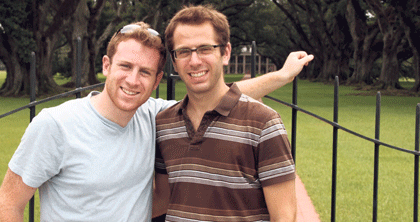Josh Scheinert and his fiancé were both raised in Conservative Judaism.
Scheinert had always felt welcome at his synagogue, Beth Tikvah in Toronto, but when he and Mark Friedman got engaged this past March, they were troubled to learn the rabbi was unwilling to marry them.
“He said he’s prepared to do the ceremony in principle, but the request would have to go through various committees and get board approval,” Scheinert said. “He was doubtful that could be done by [our wedding in] February.
“Also, the shul is in the process of becoming egalitarian vis-a-vis participation of women, and they said it was ‘too much to take on.’”
He expressed frustration that, despite Conservative Judaism’s sanctioning same-sex ceremonies, the synagogue seemingly rooted its decision in “bureaucratic process.” Conversely, Rabbi Philip Scheim, the rabbi at Friedman’s family’s Conservative shul, Beth David B’nai Israel Beth Am, said he’d gladly perform a commitment ceremony for the couple, and will do so this winter.
“I’d never been asked before… and a few years ago, I might’ve said no,” Rabbi Scheim explained. “But these men are extremely committed to Jewish life, and I think that deserves communal recognition. I don’t want to deny them that.”
Unlike Orthodoxy, which disallows gay marriage, or Reform and Reconstructionist Judaism, which embrace it, in Conservative Judaism, it’s up to the individual rabbi to decide if he or she wishes to officiate at a same-sex ceremony.
Those agreeing to do this are predominantly American, and may conduct a variant on a traditional Jewish wedding ceremony. Though Canadian Conservative and modern Orthodox shuls are increasingly reaching out to queer members – and even honouring some of their non-wedding life-cycle events – some in the LGBTQ community suggest claims of “inclusion” ring hollow when homosexual congregants
are denied certain rights unhesitatingly afforded to heterosexuals.
And some LGBTQ Jews and their allies are emphasizing that, regardless of the rabbi’s stance on gay weddings, each synagogue can explore ways of making LGBTQ Jews feel included, and assess where
there’s room for improvement.
For starters, Scheinert recommends that shuls initiate conversations about where they stand on gay marriage and other LGBTQ issues before “the next Josh and Mark come knocking at their door.”
Rabbi Lisa Grushcow of Montreal’s Reform Temple Emanu-El-Beth Sholom officiates at same-sex weddings and is openly gay. “Inclusivity ultimately has to do with being welcomed, rather than tolerated,”
she said, explaining LGBTQ congregants should be able to see themselves reflected in synagogue materials, be it a photo on the website or a membership form that accommodates diverse family structures.
“And congregants need to know they can celebrate their simchahs – weddings, baby namings and brit milah – and mark their losses, all while being open about their families and their lives.”
Rabbi Aaron Levy, the modern Orthodox rabbi at the non-denominational downtown Toronto congregation Makom, doesn’t perform gay weddings, but takes care to make his congregation extremely
queer-inclusive.
He suggested that synagogues should run educational programs that relate to queer issues, because it “shows these topics aren’t taboo, but part and parcel of Jewish life and learning.”
Justine Apple, executive director of the LGBTQ Jewish group Kulanu Toronto, said she would encourage synagogues to make prayers and other materials more queer-inclusive by inserting gender-neutral language and inviting LGBTQ members up for aliyot, readings and announcements.
On whether it’s enough for shuls to welcome LGBTQ Jews but not marry them, Rabbi Michael Dolgin, senior rabbi at the Reform Temple Sinai Congregation and the first synagogue rabbi in Toronto to officiate at a gay wedding in a sanctuary almost a decade ago, noted: “I don’t comment on or criticize what other synagogues do. But I do think there’s room for every synagogue, regardless of its ideology, to create an environment that’s as welcoming and non-judgmental as possible.”
Rabbi Yael Splansky of Toronto’s Holy Blossom Temple will perform a same-sex wedding, and warned of subtler forms of exclusion of LGBTQ congregants who aren’t in the “family mode,” reflecting that
synagogues are generally better at engaging couples and families than singles of any sexual orientation.
“As more LGBT folks choose a traditional family life… more shuls and other Jewish organizations will say, ‘This is very familiar to me.’ Jewish life has always been obsessed with family life…and when someone chooses marriage and child-rearing, all of a sudden it seems so Jewish,” she said. “I’ve heard heterosexual and homosexual singles say, ‘Remember, not everyone is married with 2.5 kids,’” she said. “I think we [Jewish leaders] are wired that way and we have to be constantly mindful of providing for people outside of that.”
For Scheinert and his fiancé, a more traditional synagogue environment feels most comfortable, and they are fairly confident that the majority of people in the Conservative community are accepting of them, even
if shul policies haven’t quite caught up.
“I don’t think these shuls are hostile places,” Scheinert said. “I just think they’re slow to change. It would be nice if these institutions could reflect what’s out there within the broader Jewish community.
It would be nice if, for once, shuls were a little ahead of, instead of behind the curve.”
